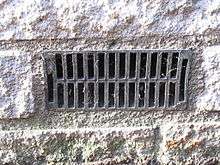Definify.com
Webster 1913 Edition
Vent
Vent
Vent
,Vent
,Vent
Which first should issue from the narrow
Vent
,Webster 1828 Edition
Vent
VENT
,VENT
,VENT
,Definition 2026
vent
vent
English
Noun
vent (plural vents)

- An opening through which gases, especially air, can pass.
- the vent of a cask; the vent of a mould
- A small aperture.
- Shakespeare
- Look, how thy wounds do bleed at many vents.
- Alexander Pope
- Long 'twas doubtful, both so closely pent, / Which first should issue from the narrow vent.
- Shakespeare
- The opening of a volcano from which lava flows.
- A verbalized frustration.
- The excretory opening of lower orders of vertebrates.
- A slit in the seam of a garment.
- The opening at the breech of a firearm, through which fire is communicated to the powder of the charge; touchhole.
- In steam boilers, a sectional area of the passage for gases divided by the length of the same passage in feet.
- Opportunity of escape or passage from confinement or privacy; outlet.
- Emission; escape; passage to notice or expression; publication; utterance.
- Milton
- without the vent of words
- Shakespeare
- Thou didst make tolerable vent of thy travel.
- Milton
Derived terms
Translations
|
Verb
vent (third-person singular simple present vents, present participle venting, simple past and past participle vented)
- (intransitive) To allow gases to escape.
- The stove vents to the outside.
- (transitive) To allow to escape through a vent.
- Exhaust is vented to the outside.
- (transitive, intransitive) To express a strong emotion.
- He vents his anger violently.
- Can we talk? I need to vent.
- 2013 June 18, Simon Romero, "Protests Widen as Brazilians Chide Leaders," New York Times (retrieved 21 June 2013):
- But the demonstrators remained defiant, pouring into the streets by the thousands and venting their anger over political corruption, the high cost of living and huge public spending for the World Cup and the Olympics.
- To snuff; to breathe or puff out; to snort.
- (Can we find and add a quotation of Spenser to this entry?)
Translations
|
|
Etymology 2
Clipping of ventriloquism
Noun
vent (plural vents)
Derived terms
- vent puppet
Etymology 3
French vente, from Latin vendere (“to sell”).
Noun
vent
- sale; opportunity to sell; market
- (Can we find and add a quotation of Shelton to this entry?)
- Sir W. Temple
- There is no vent for any commodity but of wool.
Verb
vent (third-person singular simple present vents, present participle venting, simple past and past participle vented)
Etymology 4
Spanish venta (“a poor inn, sale, market”). See vent (“sale”).
Noun
vent (plural vents)
Dutch
Pronunciation
- Rhymes: -ɛnt
Etymology
From Middle Dutch vent (“hero; man”). Unknown earlier origin. Compare West Frisian feint (“servant; fellow; boyfriend”).
- Possibly from Proto-Germanic *fanþijô (“walker, walking”), from Proto-Indo-European *pent-, *penth- (“to go, pass”). This would make it related to Dutch vinden (“to find; (archaic) to explore”) and cognate to Old High German fendo (“footsoldier”) and Old English fēþa (“footsoldier”). The expected descendant in Dutch would have been vend(e), which existed in Middle Dutch as vende (“pawn in a chess game; farmer”). Final-obstruent devoicing is common in Dutch and was already widespread in Old Dutch, rendering vent as a variant of vend(e) possible.
- Possibly a shortening of vennoot (“partner (in a company)”), which is equivalent to a compound of veem (“(storage) company”) + genoot (“companion, partner”), but there is no evidence of an overlap in sentences.
Noun
vent m (plural venten, diminutive ventje n)
Verb
vent
- first-, second- and third-person singular present indicative of venten
- imperative of venten
French
Etymology
From Old French, from Latin ventus, from Proto-Italic *wentos, ultimately from Proto-Indo-European *h₂wéh₁n̥ts < *h₂weh₁- (“to blow”).
Pronunciation
- IPA(key): /vɑ̃/
Noun
vent m (plural vents)
- Atmospheric wind.
- (euphemistic) A flatulence.
- (uncountable) Empty words, hot air.
- Toutes ces promesses, c'est du vent. — Those are empty promises.
Synonyms
- (flatulence): pet (neutral)
- (empty words): paroles en l'air
Derived terms
|
|
Related terms
|
|
See also
Norman
Etymology
From Old French vent, from Latin ventus, from Proto-Indo-European *h₂weh₁- (“to blow”).
Pronunciation
Noun
vent m (plural vents)
Derived terms
|
|
|
Old French
Pronunciation
- IPA(key): /vãnt/
- Rhymes: -ãnt
Noun
vent m (oblique plural venz or ventz, nominative singular venz or ventz, nominative plural vent)
- wind (movement of air)
- circa 1110, Benedeit, Le Voyage de saint Brandan:
-
Un meis sanz vent nagerent tut plein
- They sailed for a whole month without wind
-
Un meis sanz vent nagerent tut plein
-